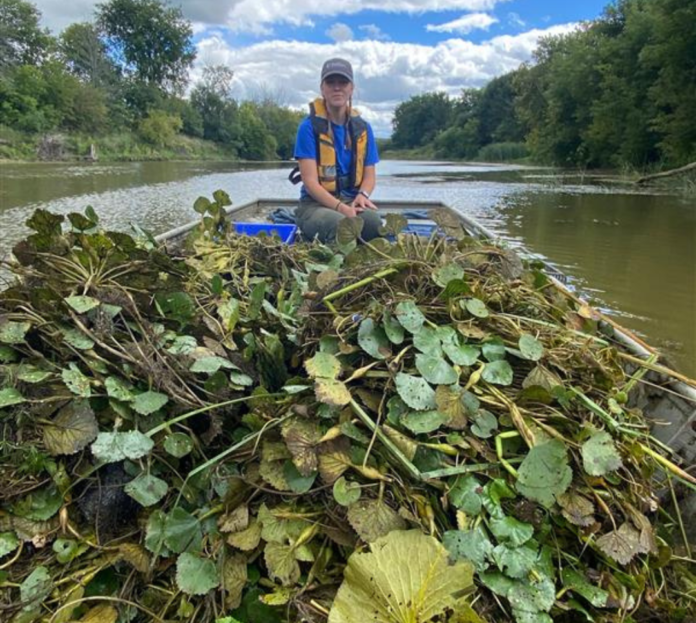submitted by SNC
South Nation Conservation (SNC) is working to combat a fast-spreading invasive aquatic plant called the European Water Chestnut which was first discovered within the South Nation Watershed last year.
In the summer of 2022, SNC received reports of the presence of the invasive plant in various locations along the South Nation River and the Castor River in Eastern Ontario. Since these locations are outside of its known distribution in Ontario, it is considered a serious concern. “European Water Chestnut is a very aggressive and rapidly spreading invasive plant, so it’s important that we act quickly to protect our local waterways,” explains Michelle Cavanagh, Team Lead of Special Projects at SNC.
Surveys were completed to validate the reports and record established populations after initial removal in August 2022.
Currently, the European Water Chestnut populations have been confirmed along a 6 km stretch of South Nation River between Oak Valley Pioneer Park and Cass Bridge Conservation Area. Several more locations have been identified along the Castor River between Embrun and Casselman. SNC staff will work to manually remove the invasive plant in these locations starting in June 2023.
The work to remove the plant will include monitoring, eDNA sampling and control and manual removal activities, in accordance with the Prevention and Response Plan for European Water Chestnut in Ontario developed by the Ontario Ministry of Natural Resources and Forestry.
While the plant is not directly harmful to humans, it does form extremely dense floating mats of vegetation quickly and begins to shade out native plant species, decreasing plant biodiversity in waterways. Aside from its effects on ecosystems and the plants and animals that live there, it also makes recreational activities like swimming, angling, and boating difficult within highly infested areas.
SNC is reminding residents to be aware of invasive species within the watershed and encourages them to report any discoveries to the Conservation Authority. Invasive species sightings can also be made online at www.eddmaps.org or by phone to the Ontario Federation of Anglers and Hunters ‘Invading Species Hotline’ at 1-800-563-7711.
“Recreational users of the rivers play a key role in monitoring the health of our waterways. The more people who are on the lookout for these new invaders, the quicker we can act when they are found,” adds Cavanagh.
To learn more about European Water Chestnut please visit: https://www.ontario.ca/page/water-chestnut




